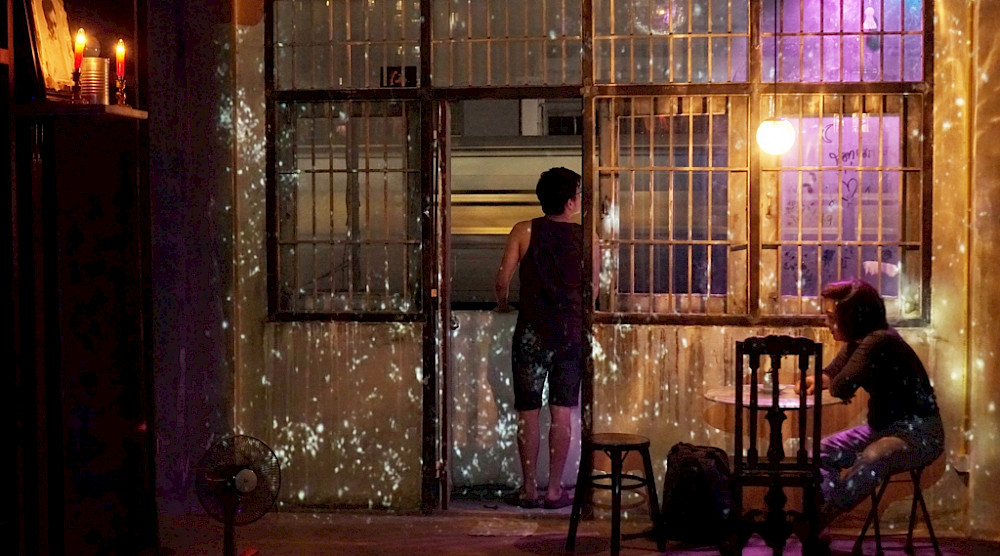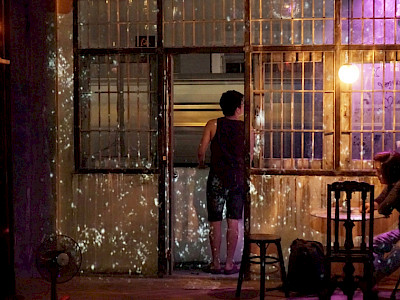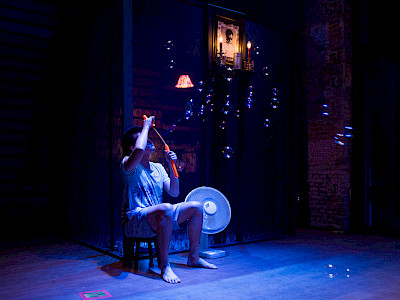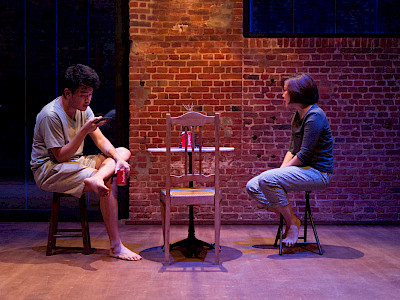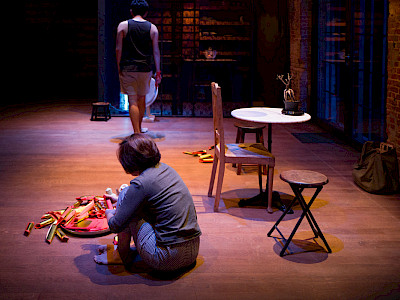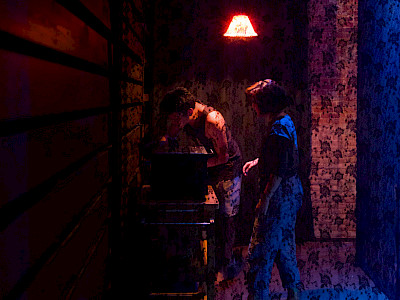11 — 16.05.2019
Wichaya Artamat Bangkok
เพลงนี้พ่อเคยร้อง / This Song Father Used to Sing (Three Days in May)
theatre
Thai → FR, NL, EN | ⧖ 1h40 | € 16 / € 13
This Song Father Used to Sing (Three Days in May) zeroes in on a small kitchen space in Bangkok. A brother and sister live through three days there in May, each time in a different calendar year. Their retiring nature contrasts with the captivating and often absurd conversations they engage in. While cooking together, they mourn and show respect for their deceased father. Past, present and future blend subtly and are connected to the political context of the Thai metropolis. Wichaya Artamat shows life as it is, without drawing a veil over its alienating character. His characters’ statements do not serve any logic and neither do they lead to a clear end. And yet it is precisely in that indeterminacy that lies the strength of This Song Father Used to Sing (Three Days in May): it shows an underlying dimension of a life that repeats itself and from which there is no escape.
The politics of an unpolitical story
Some so-called political events pass us by unnoticeably. In the turbulent sea of life, what you always care about are not any huge demonstrations on the high streets of your city, not any massacres that happened to happen to your compatriots on a darn hot day of violence, not any coup d’état with causes you should or shouldn’t care about. What matters most to you is always what happened to people in your intimate circle, your brothers and sisters, or your mum and your beloved dad – not what happened to other people.
Family affairs always appear to be much more significant than any social issues, good or bad, small or big, regal or humble.
The Song Father Used to Sing (Three Days in May) resonates with the very humane characteristics of a brother and sister who, on three different days in May of three different calendar years, ponder, mourn and talk about their late father, reflecting on the bitter sweetness of their past and present life, and, of course, lamenting some beloved songs their father used to croon.
The siblings are two middle-class Thai of Chinese origin, so their conversations are full of Chinese vibes and manners. They exchange their absurd yet captivating conversations, ask each other how they were in the past year or years. Time flies. They are getting old. An unspoken truth of death shrouds the room – not just their father’s death but their own and our own, simultaneously.
The fact that these three specific days in May happen to be the dates of three dreadful political events does not change the fact that this performance is an unpolitical story about two siblings who have never been sure of their father’s date of death. They just sit there in their father’s empty house, carrying on their never-ending talk that leads somewhere far away, on and on, over and over.
But what happened on the dates when they met? Those three days in May, though not the exact same day?
In Thailand, May 1992 is called Black May. On the 17th of that grim month, more than 200,000 people demonstrated in central Bangkok against the military regime that showed its vigorous determination to hold onto power. At the height of the protest, a military crackdown resulted in dozens of deaths, hundreds of injuries and thousands of arrests. This sad story was rescued by royal intervention at the end of the day.
On 19 May 2010, another military crack- down occurred. It was the culmination of months of red-shirt protests that called on the government to dissolve parliament and hold elections. This time the crackdown resulted in more than 85 casualties, thousands of injuries and an undisclosed number of arrests. The Thai media dubbed the crackdown ‘Savage May’. Since this menacing act of subjugation, Thai society has never been the same. It has been split in two ever since.
On 22 May 2014, the latest Thai coup d’état occurred after six months of political crisis during which Bangkok was shut down on many occasions. After the coup, the Thai military established a junta that has now governed the nation for five straight years.
It’s hard to deny that the three dates the siblings come together on are definitely political. However, the purpose of their meetings is unpolitical beyond any doubt. They are just two people who are trying to swim in their own stream of life and who share their experiences and struggles. Wichaya Artamat, the director and scriptwriter of this performance, shows us life as it is. Ordinary, simple and mundane.
Of course, life can be absurd, life can be adorable, life can be overwhelming, life can so often be too much, but life can still be unpolitical too, yes, as much or as little as it can be, and as long as one can bear it.
This Song Father Used to Sing (Three Days in May) is merely an unpolitical story with its own politics. This is a story that allows audiences to see how ordinary people can survive in a world in which they will never win, dead or alive. A world that will repeat itself May after May, day after day. A world that plays its people into the politics of the invariably unpolitical story of life.
We all live in that world, though more or less unnoticeably.
Tomorn Sookprecha,
Thai writer and critic
Director: Wichaya Artamat
Script: Wichaya Artamat, Jaturachai Srichanwanpen, Parnrut Kritchanchai
Cast: Jaturachai Srichanwanpen, Parnrut Kritchanchai, Saifah Tanthana
Scenographer: Ben Busarakamwong
Technical director & light designer: Chettapat Kheankheo
Music & video: Atikhun Adulpocatorn
Stage manager: Pathipon Adsavamahapong
Producer: Sasapin Siriwanij
Surtitling: Babel Subtitling
Presentation: Kunstenfestivaldesarts, Tour à Plomb
